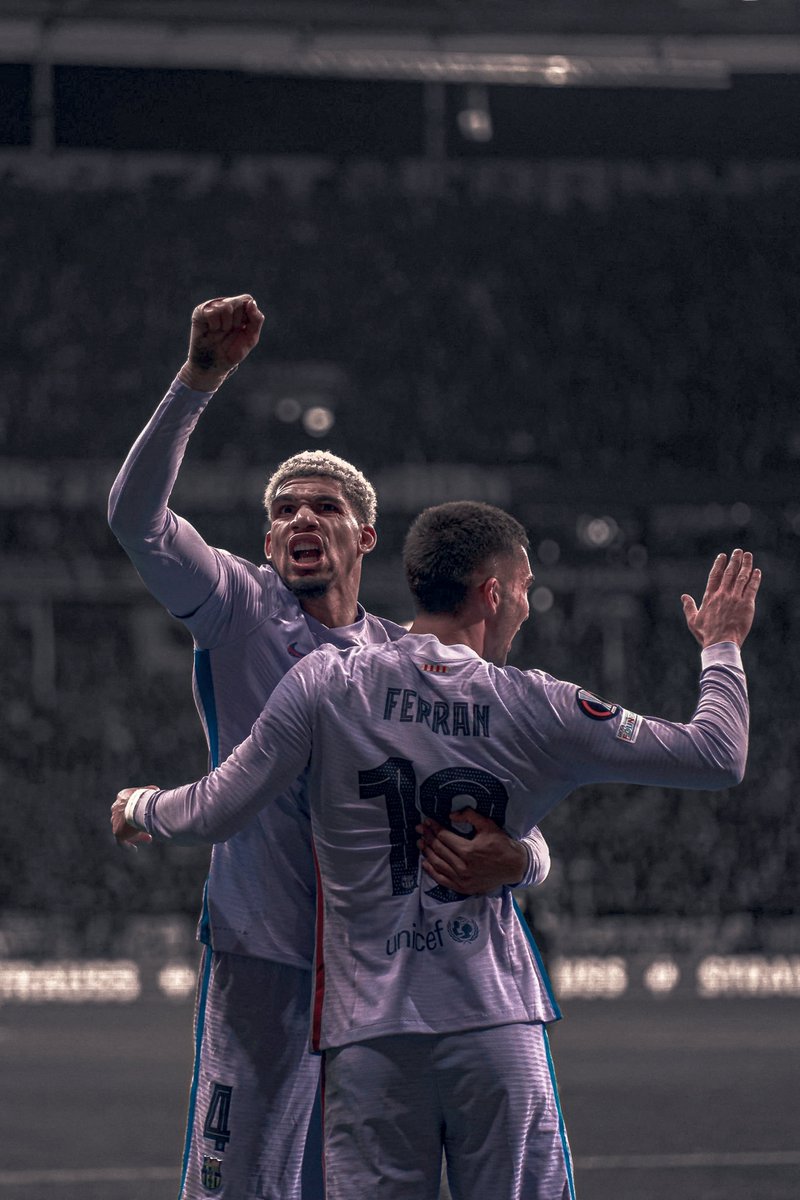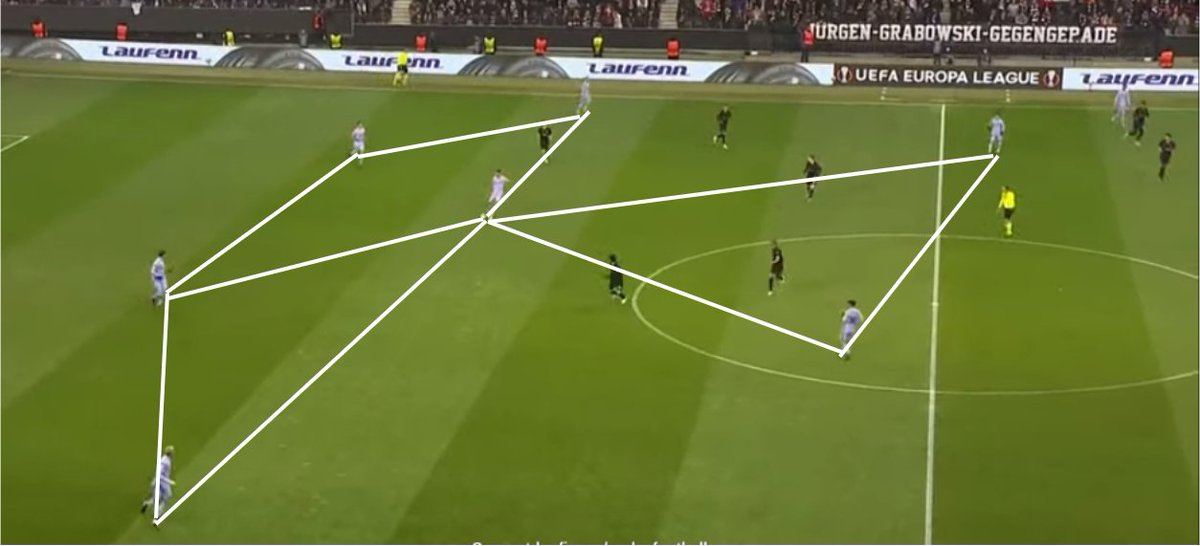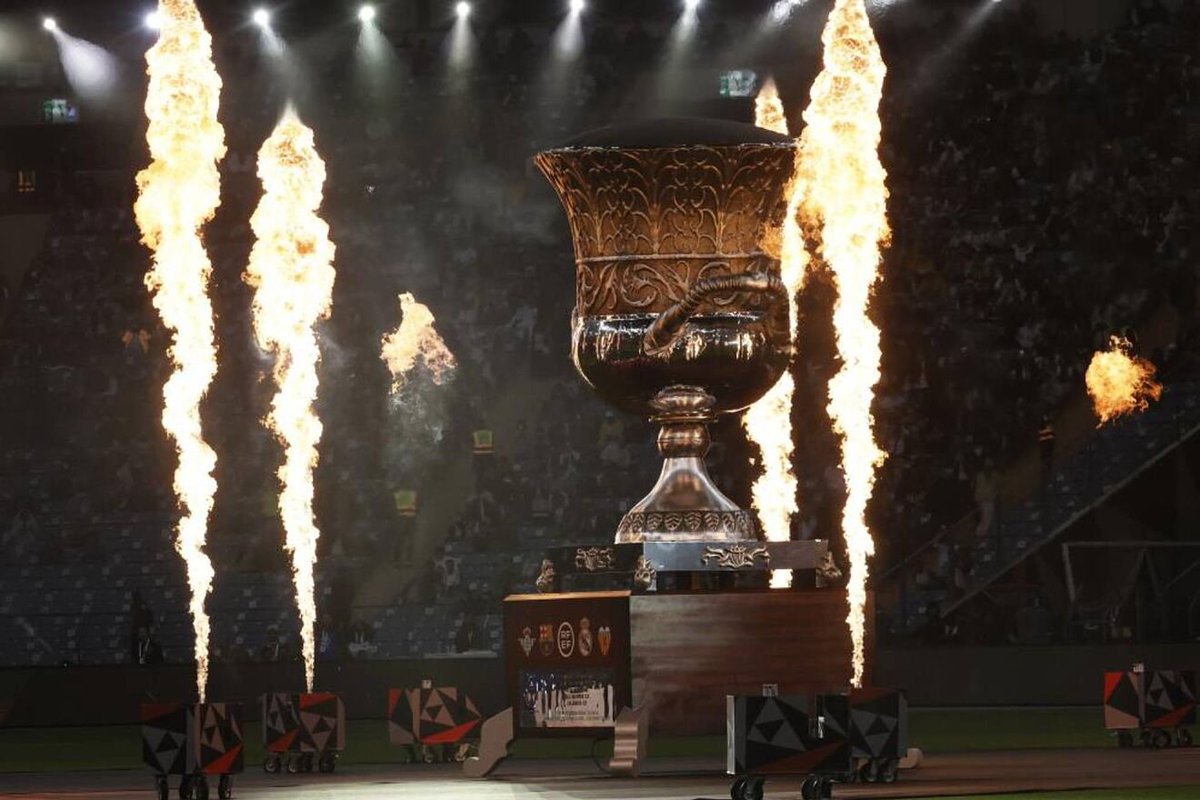Eintracht Frankfurt – F.C Barcelona:
When doubt arises from uncomfortable circumstances leading to regular, silly errors: Or how Frankfurt surprised Barcelona.
#JdPExplains
[THREAD]
📸: @Barca__pictures
When doubt arises from uncomfortable circumstances leading to regular, silly errors: Or how Frankfurt surprised Barcelona.
#JdPExplains
[THREAD]
📸: @Barca__pictures

Barcelona's structure was composed of the usual elements, originally intending a 2atb (Slight alteration following Piqué's forced substitution), nonetheless including the usual positioning of the frontline + interiors. Araujo, as expected, remained reluctant to advance forwards. 



Furthermore, Eintracht matched numbers: Adama's isolation was *too much*, as FFT always had the CB + FB on him, his threat was mostly nullified as the space he'd attack were covered. Pedri's man intercepted his lane & Araujo was also match in the 1v1.
Barcelona were stuck.
Barcelona were stuck.

Eintracht's pressing wreaked havoc in Barcelona's build-up despite a base 3atb structure as the centre-backs remained passive and failed to take advantage in the vertical & horizontal axis. Notably the latter meant Eintracht could press w/o much worry & wait for the long-ball. 

One of the aspects Araujo must improve is not necessarily his on-the-ball ability, but his decision-making: He is yet to master when to go for the long-ball from deep and when to stabilize or/and push up. Many ball losses came from attempted long-balls.
Gavi just receives the ball w/ tempo following an excellent pass from Piqué, but he's unable to use it to his own advantage. Players are easy isolated and Frankfurt's CB covers possible left-over spaces: Barcelona do not create superiority, where interiro should be closer. 



Lack of communication, Frankfurt's first big, big chance:
*Easily isolated on the wing (J.Alba)
*Two players on the same ball (frame three)
*Leads to miscommunication, Busquets misses it
*SGE now w/ tempo/momentum + large outnumbering (excellently executed!)



*Easily isolated on the wing (J.Alba)
*Two players on the same ball (frame three)
*Leads to miscommunication, Busquets misses it
*SGE now w/ tempo/momentum + large outnumbering (excellently executed!)




Barcelona needed to calm down. Seemingly running towards the ball without much clear, planned execution, such situations can be avoided (slight miscommunication), but they can turn the best situation in the worst. This situation would've led to a goal in most cases.
Moreover, a lack of incertitude caused Barcelona players to give the ball away in what should've been simple passes. There's also a certain lack of dynamism, where Barcelona players do not make themselves available as passing outlets fast enough. Time was the missing element. 



It is not that Frankfurt's pressing was necessarily well-executed or new to Barcelona: Though not accustomed to this type of pressing, what stopped Barcelona from revealing itself was time. The passer or the receiver constantly was 1'' late. It changed the entire game. 





Frankfurt's block does however merit praise given it understood that Barcelona lacked creativity on the right and decided to tightly man + zone-mark the left-wing that would become Barcelona's main source of threat. 1v2 for Ferran and the rest are tightly man-marked. 

As for the center, it is left over due to an unreasonable distance between either midfielder, failing to take advantage of Eintracht's sole weakness, that of between the lines. Barcelona needed a presence to disrupt lines, whether arriving late or constantly disrupting btl.
Repeatedly, at different phases of play, the lack of communication/interpretation of another's movement halted Barcelona: Aubameyang drops deep and rightly so, but neither from Ferran, Gavi or Pedri help run further up to split defenders: Therefore halting Aubameyang seems easy. 

Whilst patience is useful, Barcelona's lack of movement during the first phases of play caused difficulties higher up the pitch to outnumber SGE: Too rigid, the midfield kept its positions when proposing passing lanes w/ movements would've helped transmit overloads. 

What improved FFT over FCB throughout the game was that same rigidity/interpretation of space + role w & w/o the ball. FFT would press w/ 3 at the first phase, but as the game went on, they adapted to a 4+1 to be able to match Barcelona's attempted overload on either wing. 



Adama's main mentioned difference w/ Dembélé is his creativity on the ball but their movement off the ball are hardly comparable as well, as Adama decides to drop deeper despite it wouldn't create any initial advantage (questionable decision-making!) & it hurt Barcelona. 



Barcelona's issues following Piqué's substitution remained similar, that of a lack of communication: Barcelona close the player down, but his passing lanes remain open, giving the recurrent feeling of SGE being a player up in transitions as passing lanes were made available. 

Whenever FFT didn't manage to re-structure in time, Barcelona failed to take advantage of it, not building bridges btw players and hoping on the 1v1 + break-through pass , making it easier for FFT to focus on one threat at the time (not runners in behind to disrupt the defense). 

Arriving into the second half, Barcelona faced several issues that it needed to address:
*Low progression. Barcelona mostly arrived through Alba but often failed to coordinated and dismantle FFT's structure.
*Defensive issues: Many 'silly' balls lost in its own half.


*Low progression. Barcelona mostly arrived through Alba but often failed to coordinated and dismantle FFT's structure.
*Defensive issues: Many 'silly' balls lost in its own half.



As suggested before, Barcelona's structure clogged the left but still failed to dismantle the block & with little movement came little threat. Barcelona hadn't depended so much on crosses/long-balls for success in the opp box in a while: Desperation was all over Barcelona. 



What changed for Barcelona?
Two substitutions.
Dembélé, replacing Adama, was an entire new threat FFT had to adapt to, for his decision-making is vry different from Adama. Associated with Frenkie and passing options flourish faster than flowers in the spring.



Two substitutions.
Dembélé, replacing Adama, was an entire new threat FFT had to adapt to, for his decision-making is vry different from Adama. Associated with Frenkie and passing options flourish faster than flowers in the spring.




These frames seem familiar? It's Ferran's equalizer. Another change from the first half is Ferran's centrality, playing higher-up & inverting more to allow Jordi Alba to deal with the wing whilst invading space close to the penalty box. 



Ferran's importance cannot be misunderstood, still playing naturally on the wing as FFT's brain/legs were starting to wear out allowing the Spaniard to invade space behind the back of his defender as he is accustomed to do on the wing, slowly opening up play for Barcelona. 

Barcelona's Dembélé adapt more to play than Adama and it showed as Barcelona's lack of bridge was slowly only the past where FdJ + Dembélé would pop up on various situations in order to coordinated actions between teammate: Mechanism in transition kill defenses. 





Dembélé also was key in communication unlike Adama that rarely signaled his attention; Ousmane was the polar opposite, constantly requesting the ball and moving off the ball in order to advance play, in a similar fashion to FdJ. 

Frenkie's role could be resumed as a connecting bridge throughout the game, always acting as a bridge between different players or covering ground. He might not cover *as much* as he used, but he's much more efficient at his role, now more patient and he was a game-changer yday. 



Yesterday's match reminded the world that Barcelona still struggle to adapt when not given "usual" circumstances & when Plan A doesn't work & that tempo/pausa is still an issue; but it also showed how vital both FdJ + Dembélé are in these situations.
End of thread.
End of thread.
• • •
Missing some Tweet in this thread? You can try to
force a refresh






